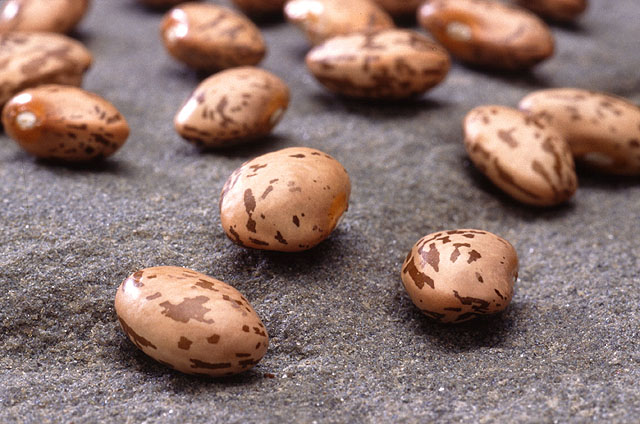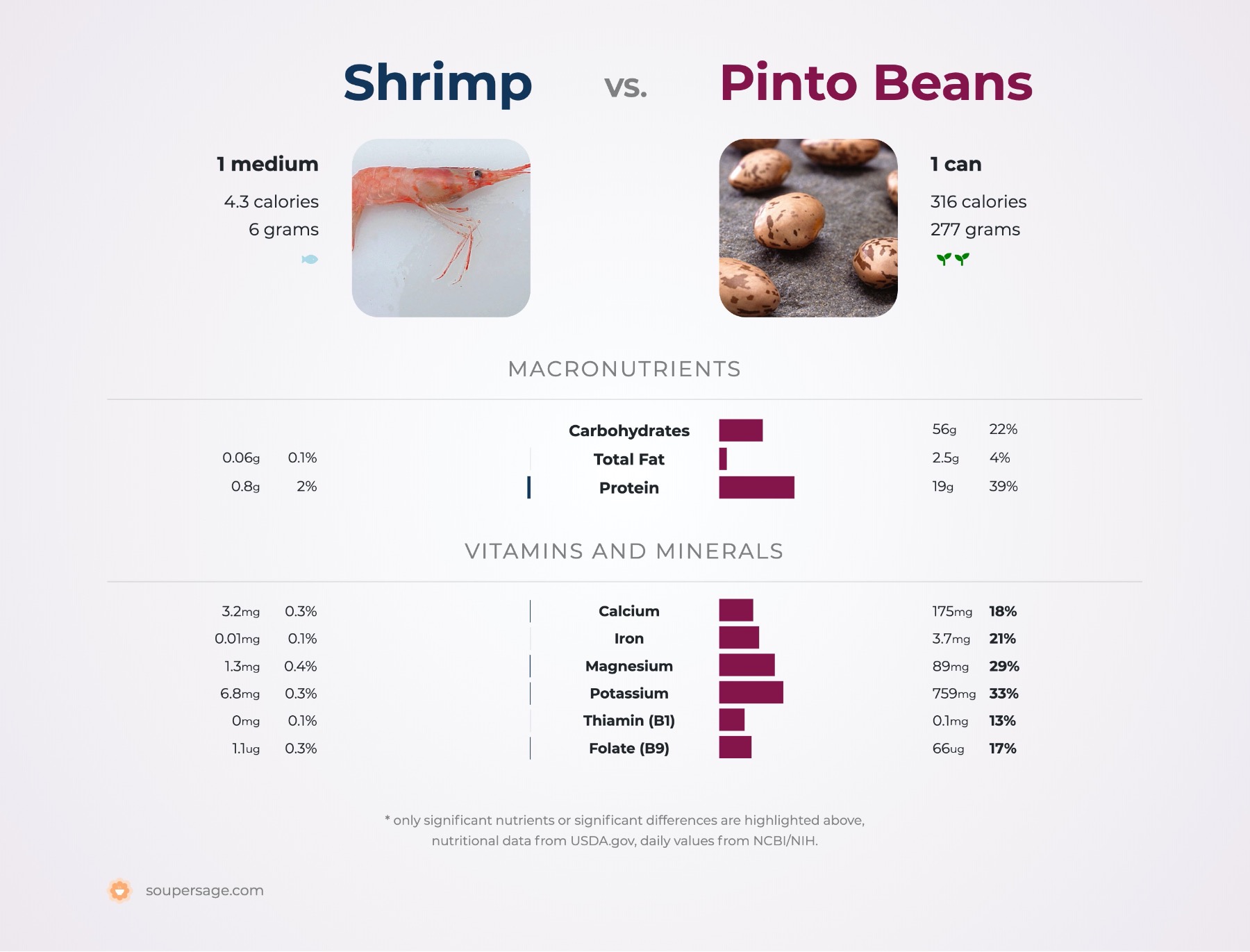Shrimp vs. Pinto Beans
Nutrition comparison of Shrimp and Pinto Beans
Ever wonder how your favorite foods stack up against each other in terms of nutrition?
We compared the nutritional contents of
shrimp
versus
pinto beans
(100g each)
below using 2020 USDA and NIH data[1].
For a quick recap of significant nutrients and differences in shrimp and pinto beans:
- Both shrimp and pinto beans are high in calcium.
- Pinto bean has more thiamin, however, shrimp contains more niacin, pantothenic acid, Vitamin B6 and Vitamin B12.
- Pinto bean has signficantly less cholesterol than shrimp.
- Pinto bean is a great source of potassium.
- Pinto bean is an excellent source of dietary fiber.
- Shrimp has 21.2 times less carbohydrates than pinto bean.
- Shrimp is an excellent source of protein.
USDA sources for nutritional information: Shrimp (Crustaceans, shrimp, mixed species, raw (may contain additives to retain moisture)) and Pinto Beans (Beans, pinto, canned, drained solids) . Have a correction or suggestions? Shoot us an email.
Calories and Carbs
calories
Pinto bean is high in calories and shrimp has 38% less calories than pinto bean - shrimp has 71 calories per 100 grams and pinto bean has 114 calories.
For macronutrient ratios, shrimp is much heavier in protein, much lighter in carbs and heavier in fat compared to pinto beans per calorie. Shrimp has a macronutrient ratio of 71:9:20 and for pinto beans, 24:69:7 for protein, carbohydrates and fat from calories.
Macro Ratios from Calories:
| Shrimp | Pinto Beans | |
|---|---|---|
| Protein | 71% | 24% |
| Carbohydrates | 9% | 69% |
| Fat | 20% | 7% |
| Alcohol | ~ | ~ |
carbohydrates
Shrimp has 21.2 times less carbohydrates than pinto bean - shrimp has 0.91g of total carbs per 100 grams and pinto bean has 20.2g of carbohydrates.
dietary fiber
Pinto bean is an excellent source of dietary fiber and it has more dietary fiber than shrimp - pinto bean has 5.5g of dietary fiber per 100 grams and shrimp does not contain significant amounts.
sugar
Pinto beans and shrimp contain similar amounts of sugar - pinto bean has 0.54g of sugar per 100 grams and shrimp does not contain significant amounts.
Protein
protein
Shrimp is an excellent source of protein and it has 95% more protein than pinto bean - shrimp has 13.6g of protein per 100 grams and pinto bean has 7g of protein.
Fat
saturated fat
Both shrimp and pinto beans are low in saturated fat - shrimp has 0.26g of saturated fat per 100 grams and pinto bean has 0.16g of saturated fat.
trans fat
Both shrimp and pinto beans are low in trans fat - shrimp has 0.02g of trans fat per 100 grams and pinto bean does not contain significant amounts.
cholesterol
Pinto bean has signficantly less cholesterol than shrimp - shrimp has 126mg of cholesterol per 100 grams and pinto bean does not contain significant amounts.
Vitamins
Vitamin C
Pinto beans and shrimp contain similar amounts of Vitamin C - pinto bean has 0.1mg of Vitamin C per 100 grams and shrimp does not contain significant amounts.
Vitamin A
Shrimp has more Vitamin A than pinto bean - shrimp has 54ug of Vitamin A per 100 grams and pinto bean does not contain significant amounts.
Vitamin D
Shrimp and pinto beans contain similar amounts of Vitamin D - shrimp has 2iu of Vitamin D per 100 grams and pinto bean does not contain significant amounts.
Vitamin E
Shrimp has more Vitamin E than pinto bean - shrimp has 1.3mg of Vitamin E per 100 grams and pinto bean does not contain significant amounts.
Vitamin K
Shrimp and pinto beans contain similar amounts of Vitamin K - shrimp has 0.3ug of Vitamin K per 100 grams and pinto bean does not contain significant amounts.
The B Vitamins
Pinto bean has more thiamin, however, shrimp contains more niacin, pantothenic acid, Vitamin B6 and Vitamin B12. Both shrimp and pinto beans contain significant amounts of riboflavin and folate.
| Shrimp | Pinto Beans | |
|---|---|---|
| Thiamin | 0.02 MG | 0.052 MG |
| Riboflavin | 0.015 MG | 0.019 MG |
| Niacin | 1.778 MG | 0.272 MG |
| Pantothenic acid | 0.31 MG | ~ |
| Vitamin B6 | 0.161 MG | ~ |
| Folate | 19 UG | 24 UG |
| Vitamin B12 | 1.11 UG | ~ |
Minerals
calcium
Both shrimp and pinto beans are high in calcium. Pinto bean has 17% more calcium than shrimp - shrimp has 54mg of calcium per 100 grams and pinto bean has 63mg of calcium.
iron
Pinto bean has 533% more iron than shrimp - shrimp has 0.21mg of iron per 100 grams and pinto bean has 1.3mg of iron.
potassium
Pinto bean is a great source of potassium and it has 142% more potassium than shrimp - shrimp has 113mg of potassium per 100 grams and pinto bean has 274mg of potassium.
Omega-3 and Omega-6
omega 3s
For omega-3 fatty acids, pinto bean has more alpha linoleic acid (ALA) than shrimp per 100 grams, however, shrimp contains more dha and epa than pinto bean per 100 grams.
| Shrimp | Pinto Beans | |
|---|---|---|
| alpha linoleic acid | 0.006 G | 0.158 G |
| DHA | 0.07 G | ~ |
| EPA | 0.068 G | ~ |
| DPA | 0.006 G | ~ |
| Total | 0.15 G | 0.158 G |
omega 6s
Comparing omega-6 fatty acids, both shrimp and pinto beans contain significant amounts of linoleic acid.
| Shrimp | Pinto Beans | |
|---|---|---|
| other omega 6 | 0.006 G | ~ |
| linoleic acid | 0.095 G | 0.115 G |
| Total | 0.101 G | 0.115 G |
Customize your serving size
The comparison below is by common portions, e.g. cups, packages. You can also see a more concrete comparison by weight at equal weight (by grams) comparison.
Note: The specific food items compared are: Shrimp (Crustaceans, shrimp, mixed species, raw (may contain additives to retain moisture)) and Pinto Beans (Beans, pinto, canned, drained solids) .
Shrimp g
()
|
Daily Values (%) |
Pinto Beans g
()
|
|||||
|---|---|---|---|---|---|---|---|
| KCAL % |
|
5% | calories | 5% |
|
KCAL % | |
| G % |
|
5% | carbohydrates | 5% |
|
G % | |
| G % |
|
5% | dietary fiber | 5% |
|
G % | |
| G | 5% | sugar | 5% | G | |||
| G % |
|
5% | total fat | 5% |
|
G % | |
| G % |
|
5% | saturated fat | 5% |
|
G % | |
| G | 5% | monounsaturated fat | 5% | G | |||
| G | 5% | polyunsaturated fat | 5% | G | |||
| G | 5% | trans fat | 5% | G | |||
| MG | 5% | cholesterol | 5% | MG | |||
| MG % |
|
5% | sodium | 5% |
|
MG % | |
| 5% | Vitamins and Minerals | 5% | |||||
| UG % |
|
5% | Vitamin A | 5% |
|
UG % | |
| MG % |
|
5% | Vitamin C | 5% |
|
MG % | |
| IU % |
|
5% | Vitamin D | 5% |
|
IU % | |
| MG % |
|
5% | calcium | 5% |
|
MG % | |
| MG % |
|
5% | iron | 5% |
|
MG % | |
| MG % |
|
5% | magnesium | 5% |
|
MG % | |
| MG % |
|
5% | potassium | 5% |
|
MG % | |
| MG % |
|
5% | thiamin (Vit B1) | 5% |
|
MG % | |
| MG % |
|
5% | riboflavin (Vit B2) | 5% |
|
MG % | |
| MG % |
|
5% | niacin (Vit B3) | 5% |
|
MG % | |
| MG % |
|
5% | Vitamin B6 | 5% |
|
MG % | |
| MG % |
|
5% | pantothenic acid (Vit B5) | 5% |
|
MG % | |
| UG % |
|
5% | folate (Vit B9) | 5% |
|
UG % | |
| UG % |
|
5% | Vitamin B12 | 5% |
|
UG % | |
| MG % |
|
5% | Vitamin E | 5% |
|
MG % | |
| UG % |
|
5% | Vitamin K | 5% |
|
UG % | |
| G % |
|
5% | protein | 5% |
|
G % | |
| UG % |
|
5% | biotin (Vit B7) | 5% |
|
UG % | |
| MG % |
|
5% | choline | 5% |
|
MG % | |
| MG % |
|
5% | chlorine | 5% |
|
MG % | |
| UG % |
|
5% | chromium | 5% |
|
UG % | |
| MG % |
|
5% | copper | 5% |
|
MG % | |
| UG % |
|
5% | fluoride | 5% |
|
UG % | |
| UG % |
|
5% | iodine | 5% |
|
UG % | |
| MG % |
|
5% | manganese | 5% |
|
MG % | |
| UG % |
|
5% | molybdenum | 5% |
|
UG % | |
| MG % |
|
5% | phosphorus | 5% |
|
MG % | |
| UG % |
|
5% | selenium | 5% |
|
UG % | |
| MG % |
|
5% | zinc | 5% |
|
MG % | |
| G | 5% | Water | 5% | G | |||
| G | 5% | Starch | 5% | G | |||
| G | 5% | Alcohol | 5% | G | |||
FAQ
Does shrimp or pinto beans contain more calories in 100 grams?Pinto bean is high in calories and shrimp has 40% less calories than pinto bean - shrimp has 71 calories in 100g and pinto bean has 114 calories.
Is shrimp or pinto beans better for protein?
Shrimp is a fantastic source of protein and it has 100% more protein than pinto bean - shrimp has 13.6g of protein per 100 grams and pinto bean has 7g of protein.
Does shrimp or pinto beans have more carbohydrates?
By weight, shrimp has 21.2 times fewer carbohydrates than pinto bean - shrimp has 0.91g of carbs for 100g and pinto bean has 20.2g of carbohydrates.
Does shrimp or pinto beans contain more calcium?
Both shrimp and pinto beans are high in calcium. Pinto bean has 20% more calcium than shrimp - shrimp has 54mg of calcium in 100 grams and pinto bean has 63mg of calcium.


